Discover financial empowerment resources
Discover financial empowerment resources
Sustained investment in Native American small business development is imperative to a philanthropic agenda focused on economic justice. Philanthropy centers justice and expedites the growth of Native American wealth building by channeling grant dollars and impact investments toward the ecosystems...
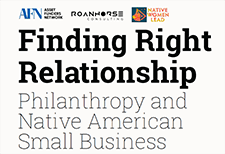
Food Banks Canada's all-new Poverty Report Cards initiative grades how poverty reduction efforts are going in the provincial, territorial, and federal governments. The report cards will help policymakers and decision-makers at all levels of government gauge their performance in the fight against...
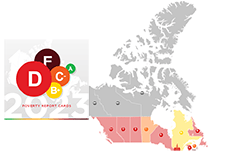
Using data primarily from the 2021 Canadian Housing Survey, this study applies a gender lens to examine the characteristics of Canadians living in subsidized housing. It examines the experiences of renters in subsidized housing and their satisfaction with their dwelling and neighbourhood, drawing...
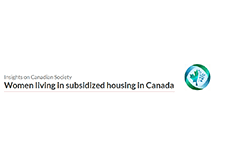
An infographic from Statistics Canada highlighting the advances made in reaching Goal 10, reducing inequalities, of the sustainable development...

The following snapshot aims to highlight how Anti-Black racism and systemic discrimination are key drivers of health inequalities faced by diverse Black Canadian communities. Evidence of institutional discrimination in key determinants of health is also presented, including education, income, and...

Government-issued identification (ID) is essential to gain access to a wide range of government entitlements, commercial services and financial systems. Lack of ID on the other hand, represents a critical barrier that prevents low-income Manitobans from accessing these services and benefits, and...
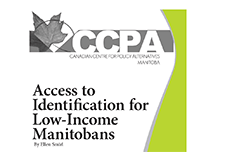
Education after high school, or postsecondary education (PSE), is an important determinant of individuals’ future opportunities, as well as their health and even lifespan. Children’s Savings Accounts (CSAs) are programs that aim to increase access to PSE by building parents’ and children’s...
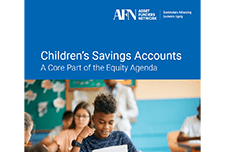
This summary provides highlights on the work the Agency has and is undertaking using existing and new data sources to provide critical insights on the social and economic impacts of COVID-19 on Canadians. It covers the first year of the pandemic from March 2020 to March...
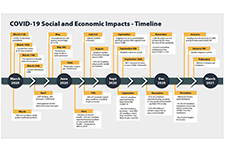
This report offers an intersectional perspective on how Canada can recover from the COVID-19 crisis and weather difficult times in the future, while ensuring the needs of all people in Canada are considered in the formation of policy. YWCA Canada and the University of Toronto’s Institute for...
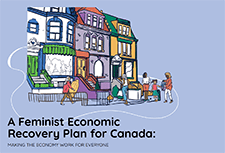
This report provides quantitative and qualitative data about the experience of hunger and poverty in Toronto during COVID-19. Based on phone surveys with over 220 food bank clients in May and June 2020 and an analysis of food bank client intake data, the report demonstrates that COVID-19 has led to...
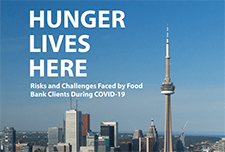
Who Pays: A Distributional Analysis of the Tax Systems in All Fifty States (the sixth edition of the report) is the only distributional analysis of tax systems in all 50 states and the District of Columbia. This comprehensive report assesses tax fairness by measuring effective state and local tax...

We characterize rates of intergenerational income mobility at each college in the United States using administrative data for over 30 million college students from 1999-2013. First, access to colleges varies greatly by parent income. Second, children from low and high-income families have very...
This is the slide deck from a webinar by Community Action Partnership for the CFED, on the racial wealth divide and the challenge of wealth building for families of color in the United States. Racial Inequality has always had economic inequality at its foundation....
...
Good public policy matters and has been effective in reducing child poverty. Indeed, without government transfers over 2 million children would live in poverty. However, to date, policy inputs against poverty have been small and poverty reduction too limited. History has shown us that no one-off...
The federal government’s decision this year to cancel family income splitting and lower the annual contribution limit for tax-free savings accounts was driven largely by concerns about income inequality. Research by the Canadian Centre for Policy Alternatives, Parliamentary Budget Officer and...
This report estimates the price of inaction. Regardless of the strategy used to address poverty, it asks, “What does it cost us to allow poverty to persist in Toronto?” It estimates how much more we may be spending in the health care and justice systems simply because poverty exists, and how...
The following profile presents data on the economic inequalities within Miami. These statistics may seem overwhelming. However, we with more information about the challenges of racial economic inequality, there is greater opportunity to identify best practices and policies that can address the...
The Government of Canada is committed to strengthening the middle class and helping low-income Canadians exit poverty so that they have sufficient capabilities to be well and do well. To achieve this goal, we will need to form partnerships, modernize the existing landscape of supports and encourage...
This is a report on child poverty in British Columbia and connections to the working poor, employment insecurity, living on low incomes, and gives policy recommendations to respond to this...
The following profile presents data on the economic inequalities within New Orleans. These statistics may seem overwhelming. However, we know with more information about the challenges of racial economic inequality, there is greater opportunity to identify best practices and policies that can...
Two years ago, our organizations released The Hidden Epidemic: A Report on Child and Family Poverty in Toronto, which documented the high level of child and family poverty in the City of Toronto and the widespread lack of access by children to decent housing, food, recreation and learning...
There is much evidence that the quality of the social determinants of health Canadians experience helps explain the wide health inequalities that exist among Canadians. How long Canadians can expect to live and whether they will experience cardiovascular disease or adult-onset diabetes is very much...
In the spirit of social justice, the Commission on Social Determinants of Health was set up by the World Health Organization (WHO) in 2005 to marshal the evidence on what can be done to promote health equity, and to foster a global movement to achieve it. The Commission calls on the WHO and all...
In the ongoing national debate over economic opportunity and rising inequality, one important factor is consistently overlooked—the price of housing in elite urban cores. Kotkin’s essay deepens our understanding of inequality and challenges the conventional wisdom about how and where we should...
